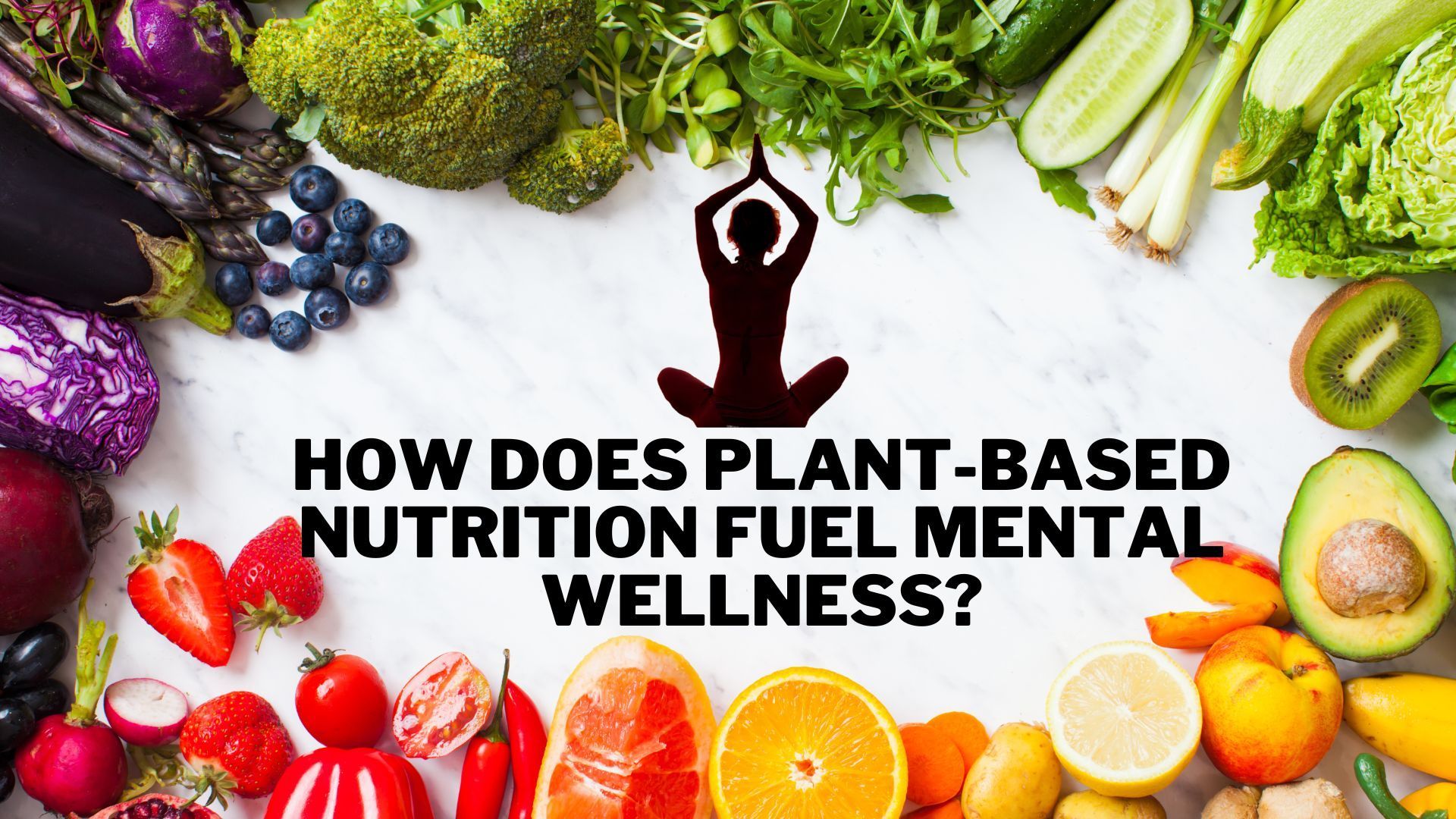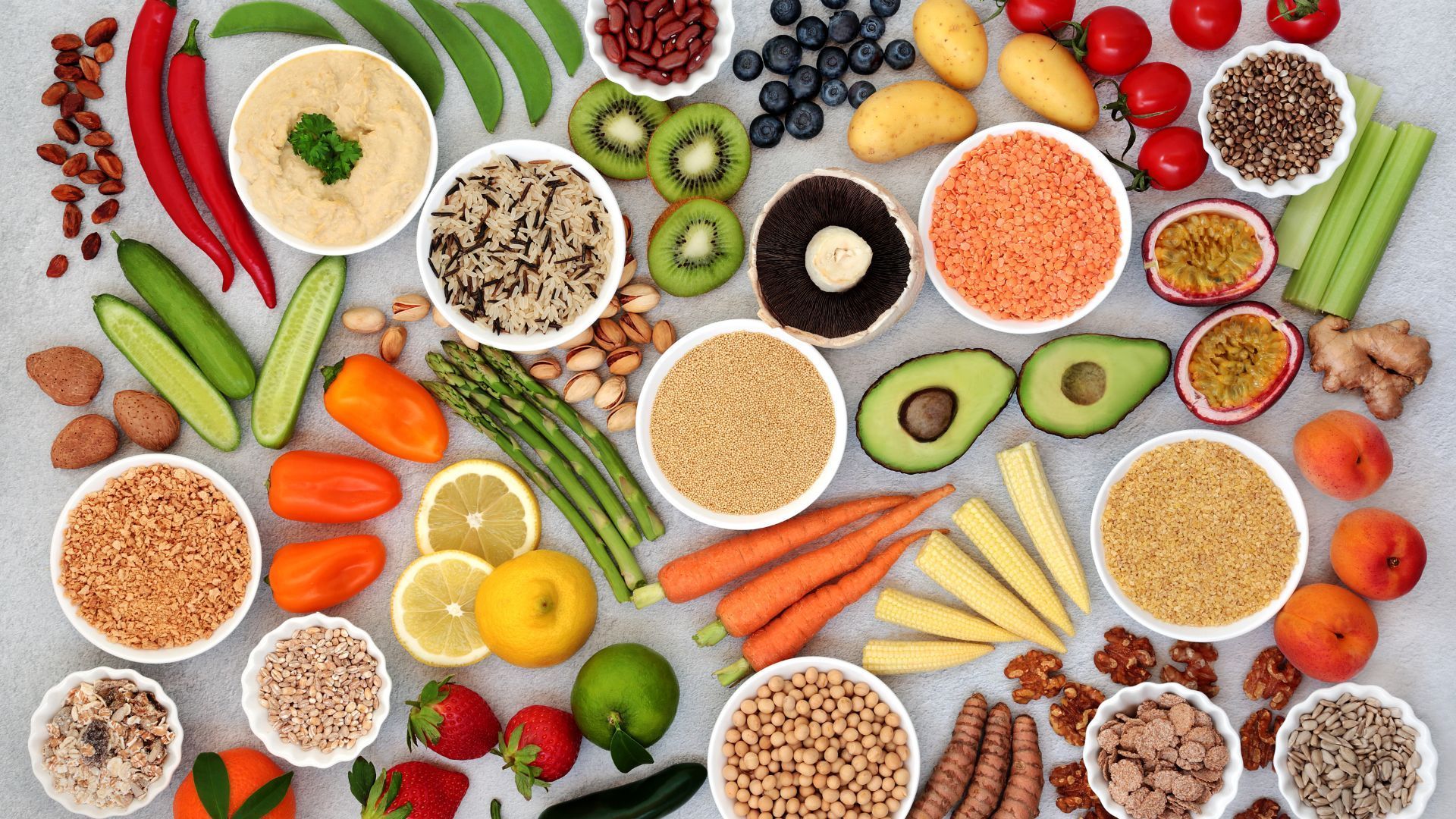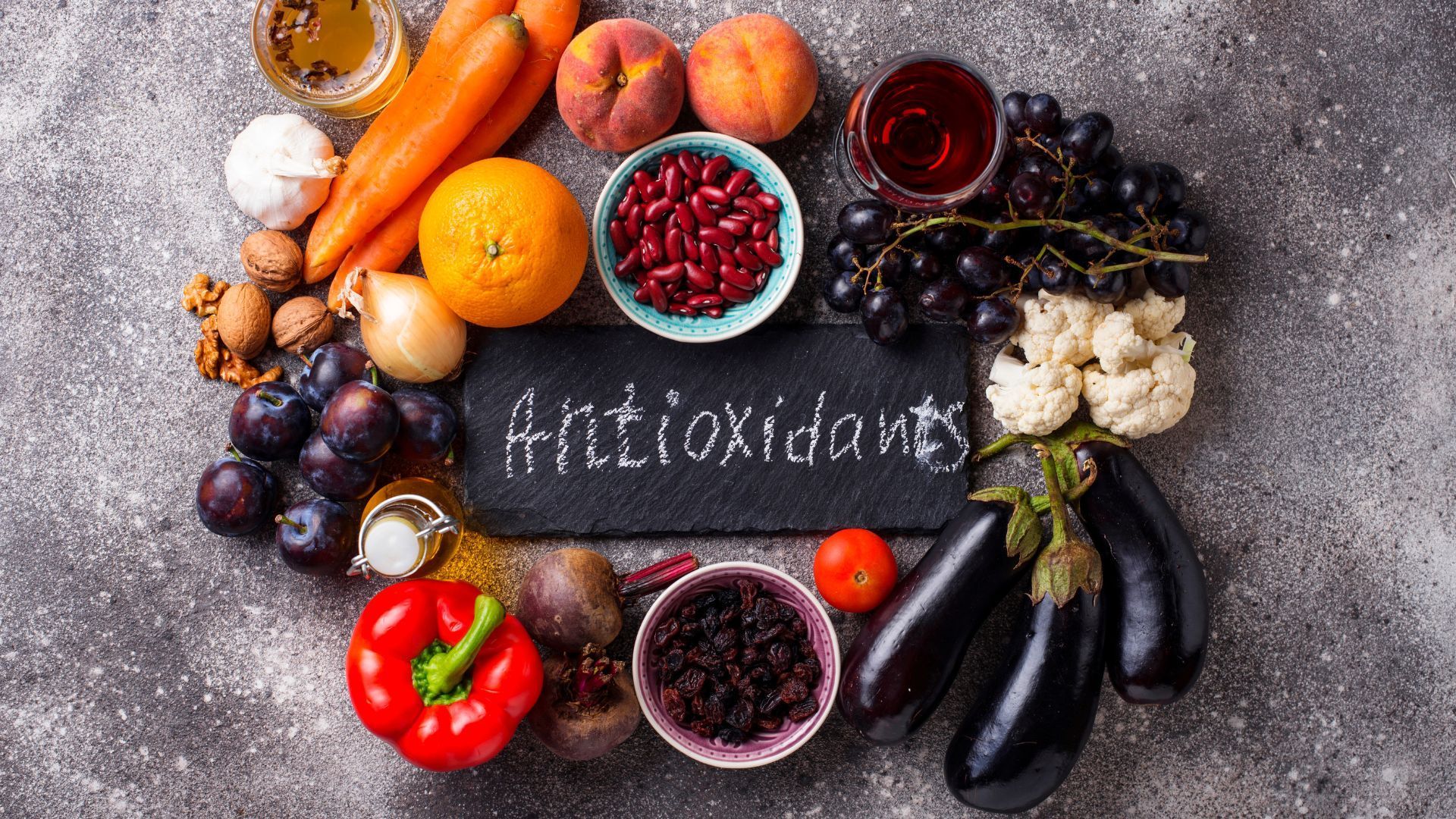How does Plant-Based Nutrition Fuel Mental Wellness?
How does Plant-Based Nutrition Fuel Mental Wellness?

Welcome to our comprehensive exploration into the world of plant-based nutrition and its transformative effects on mental wellness. This blog ventures deep into the profound connection between the foods we consume and our emotional and psychological states. Adopting a plant-based lifestyle transcends the mere benefit of physical health—it's a pathway to enriching your mental health, elevating your mood, diminishing anxiety, and fortifying emotional resilience.
Here, we'll uncover the layers of how making mindful dietary choices can substantially alter and improve our mental health outlook. The dialogue around food often focuses on physical health, but the impact on our mental wellbeing is equally profound. A plant-based diet, rich in nutrients, antioxidants, and healthy fats, plays a crucial role in brain health and emotional balance. It not only nourishes the body but also feeds the mind, offering a clarity and wellness that permeates every aspect of life.
As we navigate through the intricacies of plant-based nutrition, you will gain insights into how these foods influence neurotransmitter function, reduce inflammatory responses that affect the brain, and help maintain a healthy gut microbiome, which is essential for mental health. The journey will be filled with scientific findings, personal stories, and practical tips on integrating plant-based foods into your daily life.
By embracing the principles of plant-based eating, you embark on a journey that promises not just a healthier body but also a more vibrant, resilient mind. Join us as we explore the symbiotic relationship between plant-based nutrition and mental wellness, and discover how your diet can be a powerful tool in achieving a happier, more fulfilled life.
Understanding the Science Behind Plant-Based Diets and Mental Health

An expanding array of scientific research continues to highlight the mental health benefits of plant-based diets. The nutrients abundant in plant-based foods can significantly enhance brain function, providing a gentle yet effective boost to our cognitive processes. These dietary choices contribute to mood stabilization, improved mental clarity, and overall psychological well-being.
Whether you are grappling with specific mental health challenges or simply aiming to enhance your overall emotional wellness, this discussion aims to equip you with a deeper understanding of how a plant-based diet can be a key component of your mental health strategy. We'll also provide practical, actionable advice on how to effectively incorporate more plant-based foods into your daily regimen, making it easier for you to reap the mental health advantages of this nutritious and sustainable approach to eating.
What is a Plant-Based Diet?

A plant-based diet focuses predominantly on foods derived from plants. This dietary approach is not just about choosing plants over animal products; it's about emphasizing the richness and variety that plant foods can bring to our plates and palates. Here’s a closer look at the key components of a plant-based diet:
Vegetables and Fruits:
The backbone of any plant-based diet, vegetables and fruits are treasure troves of vitamins, minerals, antioxidants, and fiber. These nutrients are crucial for the smooth functioning of our bodies and support overall health. They also provide the necessary compounds that help combat oxidative stress, which can damage cells and lead to chronic diseases.
Nuts and Seeds:
Beyond their crunchy texture and satisfying taste, nuts and seeds are excellent sources of healthy fats, protein, and fiber. They contain essential fatty acids, such as omega-3s, which are vital for brain health and cognitive function. Incorporating a variety of nuts and seeds into your diet can help ensure a balanced intake of these important nutrients.
Whole Grains:
Unlike their refined counterparts, whole grains retain all parts of the seed—the bran, germ, and endosperm. This means they provide a fuller spectrum of nutrients, including fiber, B vitamins, and several minerals like iron, selenium, and magnesium. Fiber from whole grains helps maintain a healthy digestive system and provides a steady release of energy, which can aid in managing blood sugar levels and sustaining mental focus throughout the day.

Legumes and Beans:
Known for their rich protein content, legumes and beans are also high in fiber and low in fat. These characteristics make them filling, nourishing, and a versatile component in various culinary dishes. From stews and soups to salads and spreads, legumes and beans can be adapted to fit any meal, providing plant-based protein that is essential for muscle repair and growth.
This diet emphasizes whole, minimally processed foods, which not only provide substantial health benefits but also help reduce the environmental impact of our eating habits. A plant-based diet is celebrated for its ability to promote health while also respecting the planet. Whether you are a seasoned vegan or just looking to incorporate more plant-based meals into your life, understanding these foundational elements can help you make informed and healthful dietary choices.
How do Plant-Based Diets Enhance Mental Health?

Nutrient Density and Brain Health:
Plant-based foods are celebrated for their high nutrient density—this means they provide a large amount of essential nutrients while generally containing fewer calories. This attribute is particularly beneficial for both managing weight and reducing the risk of chronic diseases such as diabetes, heart disease, and certain cancers.
One of the standout features of plant-based diets is their high fiber content. Fiber plays a crucial role in maintaining good digestive health and contributes to prolonged feelings of fullness, which can help in effective weight management. But the benefits of fiber extend beyond just digestion and satiety:
Gut Health and Mood Regulation:
The fiber in plant-based foods helps nourish the gut microbiome, the collection of healthy bacteria in our intestines. A robust gut microbiome is crucial for overall health, including brain health. Research suggests that a healthy gut can communicate with the brain through various pathways, potentially influencing our mood and emotional health. This connection, often referred to as the "gut-brain axis," highlights how dietary fiber can play a role in mental wellness.
Blood Sugar Control:
By slowing the absorption of sugar, high-fiber foods help to stabilize blood sugar levels. Stable blood sugar levels prevent spikes and drops that can affect your mood and energy levels throughout the day. Consistent energy levels can help enhance focus, reduce irritability, and maintain mental clarity.
By incorporating a variety of fiber-rich plant-based foods into your diet, you not only support your digestive health but also contribute to a more balanced and stable mood, both of which are essential for overall brain health and cognitive function.
Reduced Saturated Fat:
One of the significant advantages of a plant-based diet is its typically low content of saturated fats, which are more prevalent in animal products such as meat, butter, and cheese. Reducing saturated fat intake is beneficial for cardiovascular health and can help maintain healthy cholesterol levels.
What are the Health Benefits for the Heart?

Improved Cholesterol Levels:
Saturated fats can raise levels of LDL cholesterol (often termed "bad" cholesterol) in the blood. Elevated LDL cholesterol increases the risk of heart disease by contributing to the buildup of plaques that can clog arteries. A plant-based diet, low in saturated fats and high in fiber, can help reduce LDL cholesterol levels and promote a healthier lipid profile.
Enhanced Blood Pressure Control:
High intake of fruits and vegetables, as seen in plant-based diets, has been linked to lower blood pressure. The potassium and magnesium found in these foods are vital for blood pressure regulation.
Mental Wellness and Plant-Based Nutrition Health Correlations:

Cognitive Function:
There is growing evidence suggesting that what benefits the heart also benefits the brain. By maintaining cardiovascular health through a diet low in saturated fats, you may also help protect your brain. Good blood flow is crucial for brain function, and any steps taken to improve heart health can also enhance blood flow to the brain, potentially reducing the risk of cognitive decline.
Mood Stability:
The brain requires a steady supply of blood, rich in oxygen and nutrients, to function properly. Improved cardiovascular health ensures that the brain receives what it needs to operate optimally, which can influence mood and mental clarity.
By emphasizing plant-based foods, which naturally contain lower levels of saturated fats, individuals can support not only their heart health but also their overall mental wellness. This aspect of plant-based eating is particularly important for maintaining long-term health and cognitive function.
Essential Nutrients' Role in Brain Health:

- Antioxidants: Present in fruits and vegetables like berries, spinach, and beets, antioxidants help combat oxidative stress that can damage brain cells.
- Omega-3 Fatty Acids: Found in flaxseeds, chia seeds, and walnuts, these are crucial for cognitive function and maintaining neuronal health.
- Vitamins B, C, and E: These vitamins, prevalent in plant-based foods, support brain health by boosting energy production and providing neuroprotective effects.
Mood-Boosting Properties:
- Complex Carbohydrates: Foods like whole grains and legumes help regulate blood sugar levels, which can significantly impact mood and energy levels throughout the day.
- Magnesium: Found in nuts and seeds, magnesium plays a pivotal role in brain function and mood regulation, helping to reduce stress and anxiety.
Role of Vidality in Promoting Plant-Based Nutrition for Mental Wellness
Vidality plays a crucial role in fostering mental wellness through the promotion of plant-based nutrition. Recognizing the profound impact that diet has on mental health, We offer tailored meal plans specifically designed to enhance cognitive function and emotional well-being. By providing easy access to nutrient-dense, plant-based foods, our team ensures that clients can readily enjoy the many cognitive and mood-boosting benefits of such a diet.
Vidality's services go beyond simple meal planning; we actively support individuals in making informed, sustainable dietary choices that have a lasting positive impact on mental health outcomes. Through personalized nutrition guidance and continuous support, Vidality empowers clients to integrate plant-based eating into their daily lives seamlessly. This approach not only promotes mental wellness but also aligns with a lifestyle that is environmentally sustainable and health-promoting.
By choosing Vidality, clients gain an ally in their journey toward improved mental health through nutrition. The expert team at Vidality is committed to helping individuals understand the link between what they eat and how they feel, providing them with the tools and knowledge needed to make beneficial dietary changes. With Vidality, embracing a plant-based diet becomes an achievable, enjoyable, and deeply rewarding journey toward greater mental wellness.

Conclusion:
As we've explored throughout this comprehensive guide, adopting a plant-based diet offers a multitude of benefits for both mental and physical health. By focusing on nutrient-rich, minimally processed plant foods, you can significantly enhance your brain function, stabilize your mood, improve cardiovascular health, and support a robust digestive system. The connection between what we eat and how we feel is undeniable, and a plant-based diet is a powerful tool for fostering overall well-being.
The scientific insights we've shared highlight how essential nutrients from plants—such as omega-3 fatty acids, antioxidants, and various vitamins—play critical roles in cognitive function and emotional stability. Moreover, the natural reduction of saturated fats in a plant-based diet supports heart health, which is intrinsically linked to brain health due to the importance of robust blood flow and nutrient delivery to the brain.
Embracing plant-based nutrition doesn't just contribute to personal health; it also respects our planet by promoting sustainable and environmentally friendly eating habits. With the practical tips and meal ideas provided, integrating more plant-based foods into your daily routine can be both enjoyable and fulfilling.
At Vidality, we are committed to supporting your journey toward a healthier, more vibrant life through tailored meal plans and comprehensive nutritional guidance. Whether you are new to plant-based eating or looking to refine your diet, Vidality is here to assist you every step of the way, ensuring that your transition is smooth, enjoyable, and profoundly beneficial.
Remember, the journey to better health through plant-based nutrition is not just about the foods you avoid but, more importantly, about the delicious and nourishing foods you choose to include. By making mindful dietary choices, you open the door to a healthier, happier life. So, let's continue to explore the rich flavors and immense benefits of plant-based eating together. Embrace the change, enjoy the journey, and transform your life, one meal at a time.
Ready to boost your mental health? Join Vidality for tailored plant-based nutrition plans and a supportive wellness community. Start your transformative journey today!










